Historical Theology
2 Volume Set
500 in stock
| Weight | 3.95 lbs |
|---|---|
| Dimensions | 8.8 × 5.6 × 3.5 in |
| ISBN | 9781800404250 |
| Binding | Cloth-bound |
| Page Count | 1408 |
| Original Pub Date | 1863 |
| Banner Pub Date | 1960 |
| Recent Pub Date Year | 2024 |
| Topic | Historical Theology |
Book Description
These two volumes are derived from Dr. Cunningham’s lectures to his Church History class at New College, Edinburgh between 1847–1861. Cunningham’s living faith, devout submission to God, clarity of thought, and reverence for the authority of the Bible make him well-positioned to comment on the relationship between the church and its theology.
The history of the Church is a history of God’s interaction with his people; Cunningham tells that story through the history of its theology, chronicling the theological tension between law and grace, sin and forgiveness, and Christ’s first and second coming.
Volume one covers the biblical view of the church, the church councils and the apostolic fathers, the development of the church’s central doctrines—such as the incarnation and the Trinity—as well as the rise of scholasticism, the Reformation, and the Council of Trent.
Volume two documents the development of the doctrines of justification and the atonement and the Arminian and the Socinian controversies. He also devotes lengthy discussions to Presbyterianism, Congregationalism, and the Free Church of Scotland.
Table of Contents Expand ↓
Volume 1 Contents
| William Cunningham’s Historical Theology—An Introduction by Donald John MacLean | ix | |
| Biographical Introduction of William Cunningham and James Bannerman by Iain H. Murray for the 1960 edition | xvii | |
| Preface | xliii | |
| INTRODUCTION | 1 | |
| CHAPTER I.—The Church | 9 | |
| I. | Nature of the Church | 9 |
| II. | Notes of the Church | 21 |
| III. | Promises to the Church | 27 |
| IV. | Different Theories of the History of the Church | 36 |
| CHAPTER II.—The Council of Jerusalem | 45 | |
| I. | Scripture Narrative | 45 |
| II. | The Rule of Church Power | 49 |
| III. | Authority of Church Officers | 52 |
| IV. | The Place of Church Members | 56 |
| V. | Subordination of Church Courts | 61 |
| VI. | Obligation of Apostolic Practice | 67 |
| VII. | Divine Right of a Form of Church Government | 76 |
| CHAPTER III.—The Apostles’ Creed | 83 | |
| CHAPTER IV.—The Apostolic Fathers | 99 | |
| I. | Barnabas | 100 |
| II. | Hermas | 101 |
| III. | Clemens Romanus | 102 |
| IV. | Polycarp | 110 |
| V. | Epistle to Diognetus | 112 |
| VI. | Ignatius | 114 |
| CHAPTER V.—The Heresies of the Apostolic Age | 127 | |
| CHAPTER VI.—The Fathers of the Second and Third Centuries | 141 | |
| I. | Justin Martyr | 141 |
| II. | Irenaeus | 147 |
| III. | Clemens Alexandrinus | 154 |
| IV. | Origen | 162 |
| V. | Tertullian | 167 |
| VI. | Cyprian | 172 |
| CHAPTER VII.—The Church of the First Two Centuries | 181 | |
| I. | The Doctrines of Grace | 188 |
| II. | The Sufficiency of Scripture | 193 |
| III. | Rights of the Christian People | 199 |
| IV. | Idolatry | 206 |
| V. | The Sacraments | 212 |
| VI. | The Papal Supremacy | 218 |
| CHAPTER VIII.—The Constitution of the Church | 239 | |
| I. | Prelacy:—State of the Question | 244 |
| II. | Prelacy:—Argument from Antiquity | 257 |
| CHAPTER IX.—The Doctrine of the Trinity | 281 | |
| I. | Testimony of the Early Church on the Trinity | 281 |
| II. | Nicene Creed—Consubstantiality | 294 |
| III. | Nicene Creed—the Eternal Sonship | 309 |
| IV. | Nicene Creed—Procession of the Spirit | 321 |
| CHAPTER X.—The Person of Christ | 323 | |
| I. | The Eutychian Controversy | 327 |
| II. | The Nestorian Controversy | 332 |
| CHAPTER XI.—The Pelagian Controversy | 339 | |
| I. | Historical Statement | 342 |
| II. | Depravity—Original Sin | 352 |
| III. | Conversion—Sovereign and Efficacious Grace | 365 |
| IV. | Perseverance of the Saints | 374 |
| CHAPTER XII.—The Worship of Saints and Images | 379 | |
| I. | Historical Statement | 381 |
| II. | Doctrinal Exposition | 391 |
| CHAPTER XIII.—The Civil and Ecclesiastical Authorities | 411 | |
| I. | Voluntaryism | 411 |
| II. | Co-ordinate Authorities | 415 |
| III. | Erastiansim | 418 |
| IV. | Popish Theory | 423 |
| CHAPTER XIV.—Scholastic Theology | 437 | |
| CHAPTER XV.—The Canon Law | 451 | |
| CHAPTER XVI.—Witnesses for the Truth during the Middle Ages | 467 | |
| I. | Perpetuity and Visibility of the Church | 474 |
| II. | Waldenses and Albigenses | 479 |
| CHAPTER XVII.—The Church at the Era of the Reformation | 489 | |
| CHAPTER XVIII.—The Council of Trent | 515 | |
| CHAPTER XIX.—The Doctrine of the Fall | 529 | |
| I. | Popish and Protestant Views | 529 |
| II. | Guilt of Adam’s First Sin | 535 |
| III. | The Want of Original Righteousness | 550 |
| IV. | Corruption of Nature | 563 |
| V. | Concupiscence | 566 |
| VI. | Sinfulness of Works before Regeneration | 578 |
| VII. | Sinfulness of Works after Regeneration | 591 |
| CHAPTER XX.—The Doctrine of the Will | 605 | |
| I. | The Will before and after the Fall | 616 |
| II. | The Bondage of the Will | 625 |
| III. | Bondage of the Will—Objections | 628 |
| IV. | The Will in Regeneration | 654 |
| V. | God’s Providence, and Man’s Sin | 667 |
Volume 2
| CHAPTER XXI.—Justification | 1 | |
| I. | Popish and Protestant Views | 10 |
| II. | Nature of Justification | 33 |
| III. | Imputation of Christ’s Righteousness | 48 |
| IV. | Justification by Faith Alone | 60 |
| V. | Office of Faith in Justifying | 73 |
| VI. | Objections to the Scriptural Doctrine | 85 |
| VII. | The Forgiveness of Post-baptismal Sins | 96 |
| VIII. | The Merit of Good Works | 108 |
| IX. | Practical Tendency of the Popish Doctrine of Justification | 119 |
| CHAPTER XXII.—The Sacramental Principle | 129 | |
| I. | Sacramental Grace | 129 |
| II. | Baptismal Regeneration | 142 |
| III. | Popish View of the Lord’s Supper | 151 |
| IV. | Infant Baptism | 153 |
| CHAPTER XXIII.—The Socinian Controversy | 165 | |
| I. | Origin of Socinianism | 166 |
| II. | Socinian Views as to Scripture | 170 |
| III. | Socinian System of Theology | 178 |
| IV. | Original and Recent Socinianism | 199 |
| V. | Distinctions of Persons in the Godhead | 203 |
| VI. | Trinity and Unity | 215 |
| VII. | Evidence for the Divinity of Christ | 226 |
| CHAPTER XXIV.—Doctrine of the Atonement | 251 | |
| I. | Connection between the Person and Work of Christ | 251 |
| II. | Necessity of the Atonement | 264 |
| III. | The Necessity and Nature of the Atonement | 276 |
| IV. | Objections to the Doctrine of the Atonement | 285 |
| V. | Scriptural Evidence for the Atonement | 296 |
| VI. | Socinian View of the Atonement | 311 |
| VII. | Arminian View of the Atonement | 318 |
| VIII. | Extent of the Atonement | 342 |
| IX. | Evidence as to the Extent of the Atonement | 355 |
| X. | Extent of Atonement and Gospel Offer | 363 |
| XI. | Extent of Atonement, and its Object | 368 |
| XII. | Extent of the Atonement, and Calvinistic Principles | 380 |
| CHAPTER XXV.—The Arminian Controversy | 393 | |
| I. | Arminius and the Arminians | 393 |
| II. | Synod of Dort | 401 |
| III. | The Five Points | 407 |
| IV. | Original Sin | 409 |
| V. | Universal and Effectual Calling | 417 |
| VI. | Efficacious and Irresistible Grace | 429 |
| VII. | The Decrees of God | 441 |
| VIII. | Predestination—State of the Question | 456 |
| IX. | Predestination, and the Doctrine of the Fall | 464 |
| X. | Predestination, and the Omniscience of God | 466 |
| XI. | Predestination, and the Sovereignty of God | 476 |
| XII. | Scripture Evidence for Predestination | 485 |
| XIII. | Objections against Predestination | 499 |
| XIV. | Perseverance of Saints | 518 |
| XV. | Socinianism—Arminianism—Calvinism | 530 |
| CHAPTER XXVI.—Church Government | 543 | |
| I. | Presbyterianism | 543 |
| II. | Testimony of the Reformers as to Presbyterianism | 555 |
| III. | Popular Election of Office-bearers | 564 |
| IV. | Congregationalism, or Independency | 576 |
| CHAPTER XXVII.—The Erastian Controversy | 589 | |
| I. | The Civil Magistrate and Religion | 589 |
| II. | Erastus and the Erastians | 602 |
| III. | Erastianism during the Seventeenth Century | 610 |
| IV. | The Free Church of Scotland | 617 |
| INDEX | 623 |
You may also like…
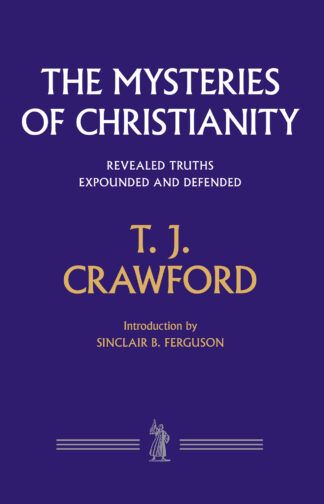
The Mysteries of Christianity
Revealed Truths Expounded and Defended
Description
Historical Theology is a two-volume work derived from Dr. Cunningham’s lectures to his Church History class at New College, Edinburgh between 1847–1861. Clothbound, 1408 pages.
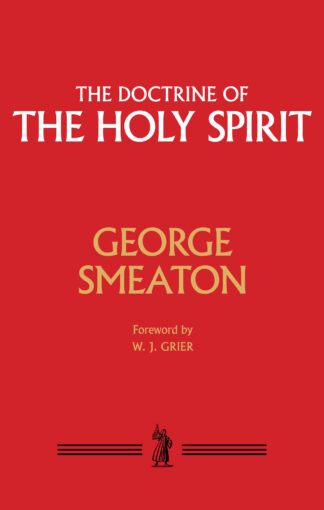
Description
Historical Theology is a two-volume work derived from Dr. Cunningham’s lectures to his Church History class at New College, Edinburgh between 1847–1861. Clothbound, 1408 pages.

The Doctrine of Justification
An outline of its history in the Church and of its exposition from Scripture
Description
Historical Theology is a two-volume work derived from Dr. Cunningham’s lectures to his Church History class at New College, Edinburgh between 1847–1861. Clothbound, 1408 pages.
Related products

Evangelical Theology
Lectures on Doctrine
Description
Historical Theology is a two-volume work derived from Dr. Cunningham’s lectures to his Church History class at New College, Edinburgh between 1847–1861. Clothbound, 1408 pages.
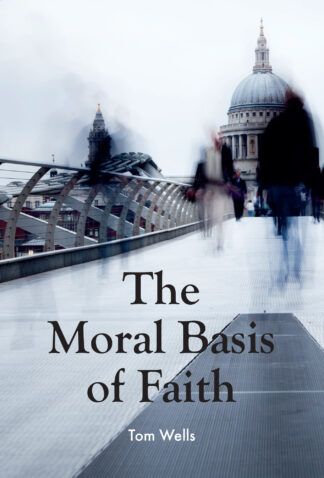
Description
Historical Theology is a two-volume work derived from Dr. Cunningham’s lectures to his Church History class at New College, Edinburgh between 1847–1861. Clothbound, 1408 pages.

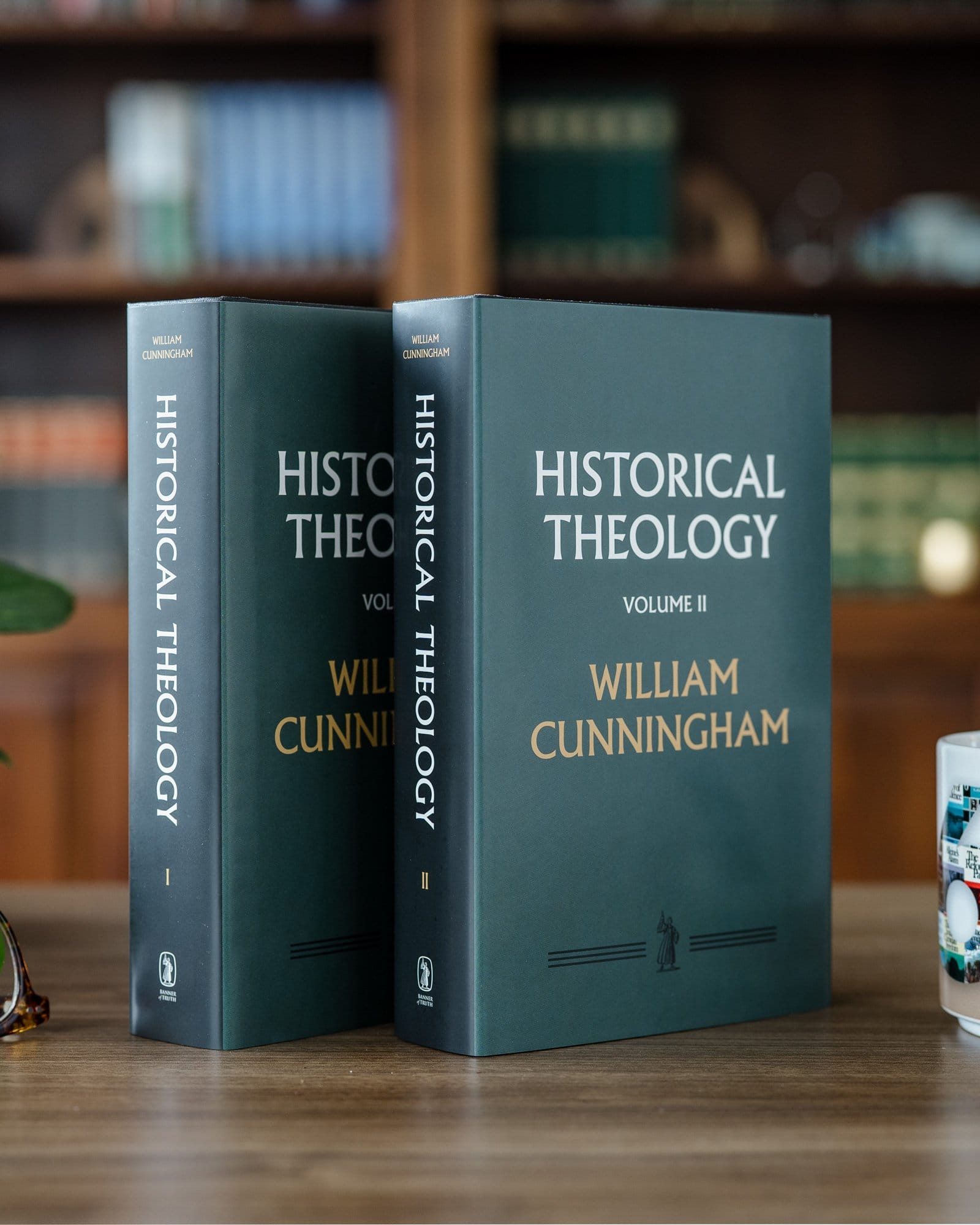
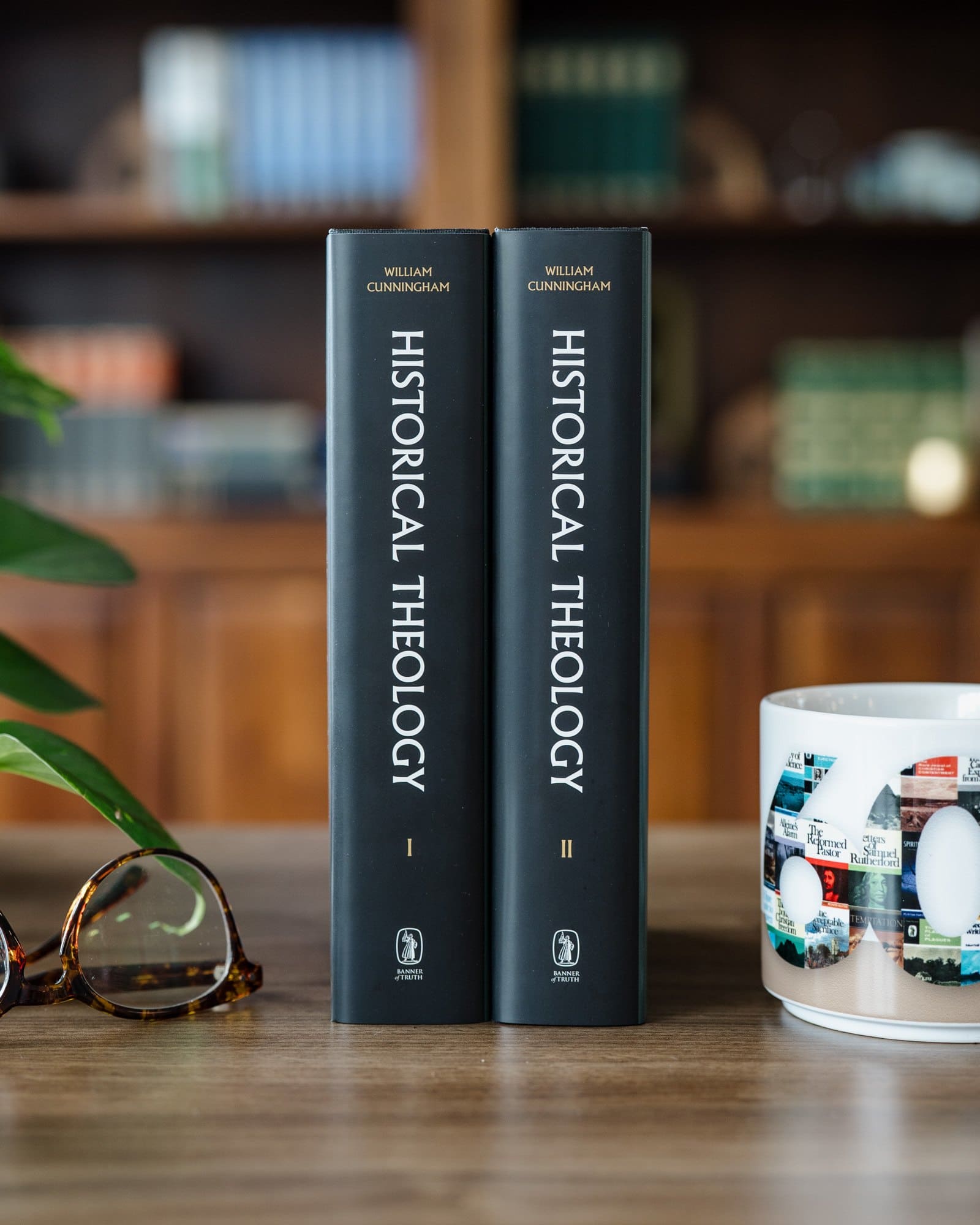

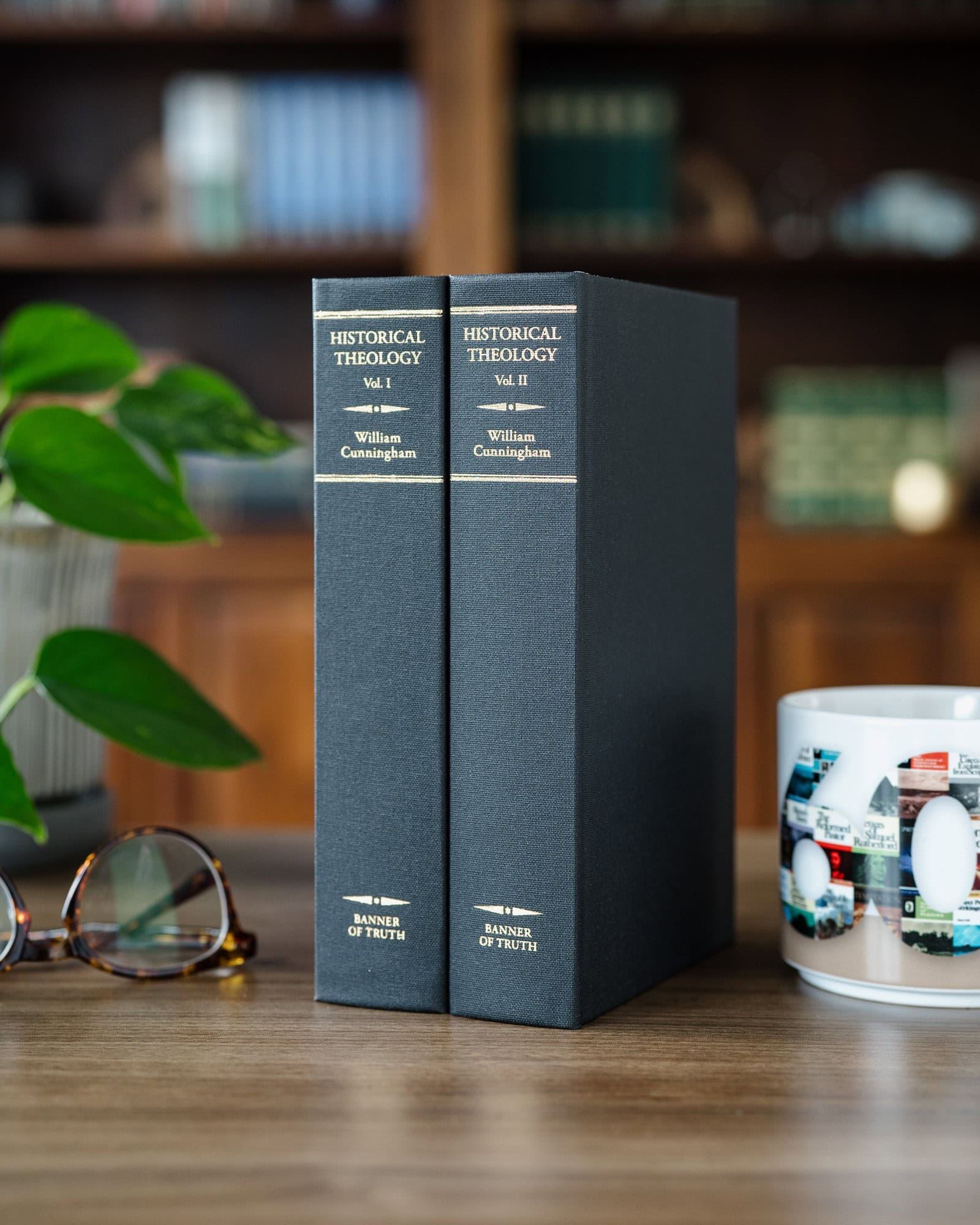
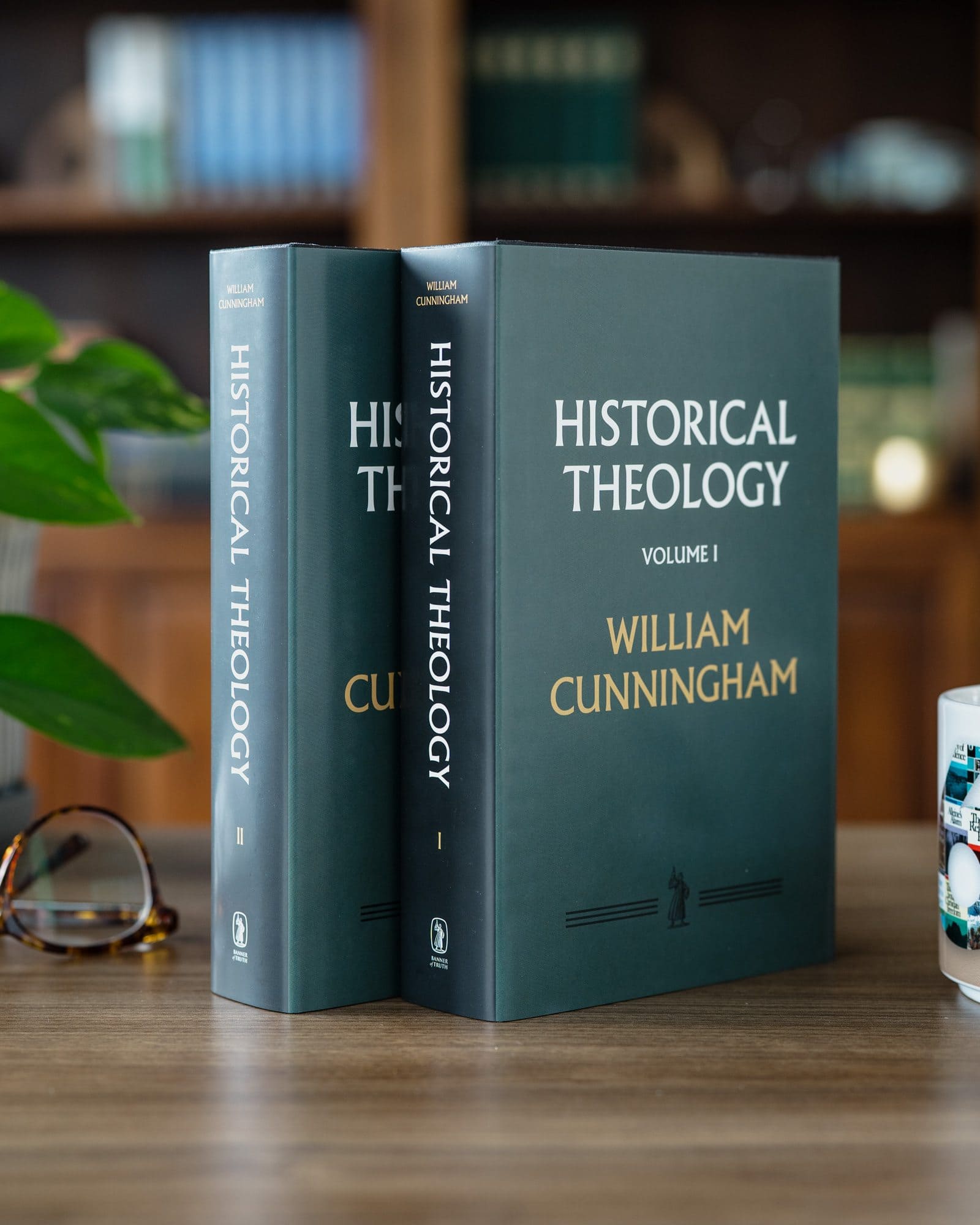
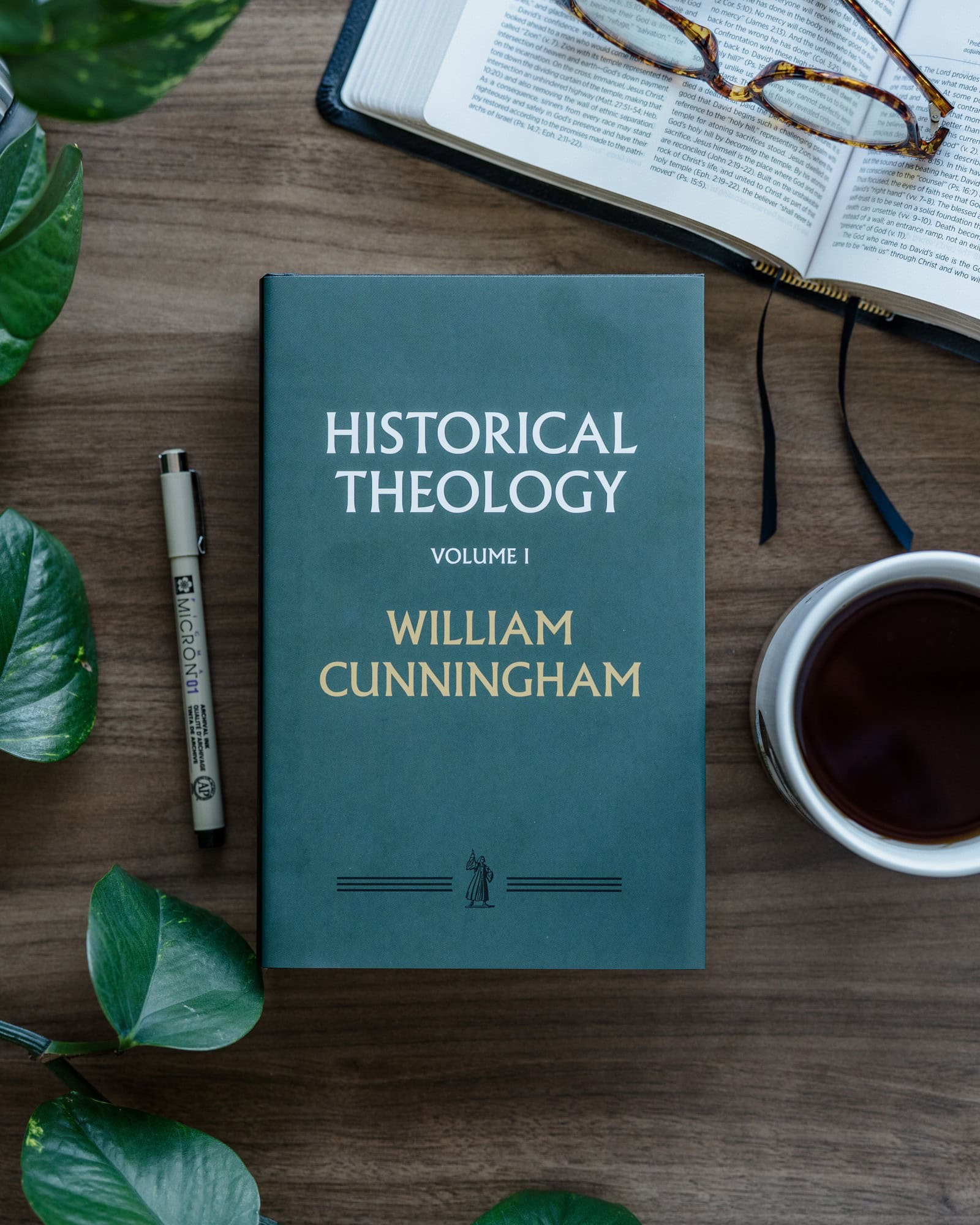
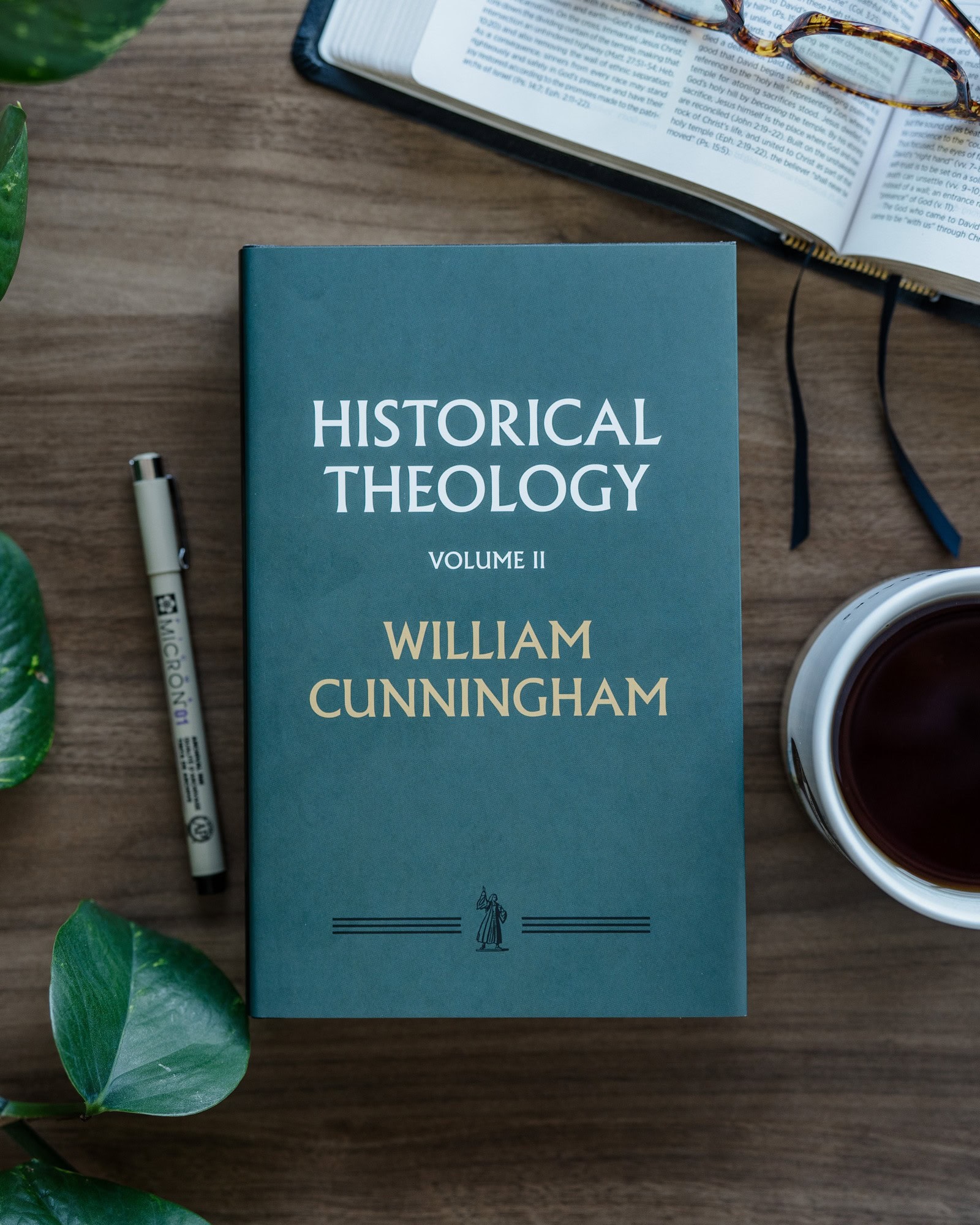


Richard C Ross –
These important volumes allow the reader to relish the style of theology echoing through ‘New College’ under Principle William Cunningham. That style was dense, cerebral and forensic. This latter quality is most evident in Cunningham’s review of the doctrine of the Trinity, in volume one. This is, of course, by far the most important subject in Cunningham’s survey of ‘historical theology’. Not that you’d guess it from his treatment, anymore than you would from a majority of ‘Reformed’ systematic theologies produced in the last couple of centuries.
John ‘Rabbi’ Duncan, with characteristic perception, observed, ‘You will never find a Roman priest wandering from the catholic faith on the Person of Christ, or in reference to the Trinity’ (Just a Talker, 154). Sadly the same cannot be said of every ‘Reformed’ theologian. Inevitably, true to type, Cunningham offers no recognition of the fact that the Christian Church owes the developed doctrine of the Trinity above all to the church of Rome, her early bishops and popes. This must not be assumed to be a piece of propaganda; it is a fact of historical theology.
Cunningham works on the ‘democratic’ principle, rather than the ‘ecclesiastical’ principle; his assessment of early Christian opinion is concerned with counting witnesses, rather than focusing on the settled position of the Church with regard to this doctrine, a position that never wavered from the Scriptural truth, and has not wavered from it since. His forensic approach is essentially rationalistic; we find no recognition of the spiritual principle that the believer, enlightened by the indwelling Holy Spirit, is not merely pre-disposed to accept trinitarian truth but is granted, in a form of pre-conceptual knowledge, the replete doctrine, which then he struggles to articulate. Cunningham notes that certain statements of the fathers are ‘not easy to reconcile with the orthodox doctrine’, and unwarrantably and unhistorically, accuses the fathers of writing ‘loosely and carelessly’. The fact is trinitarian vocabulary and grammar evolved only slowly through decades of controversies (but see page 293f).
Most important in Cunningham’s response is his unreserved endorsement of Nicene trinitarian theology, specifically the generation of the Son (see page 320). He mistakenly relegates the importance of this aspect of trinitarian theology; the fact is there is no element of trinitarian theology of greater importance: the Christian’s whole understanding of God’s nature and character hinges on his response to the mystery of the Father’s begetting of the Son.
The Nicene theology attributes to the Father, in his eternal begetting of the Son, the generation of the Son’s entire being, expressed simply in the creedal statement, ‘God of God, Light of Light, Very God of Very God…’. This Calvin rejected. Following Calvin’s eccentric response to Nicene orthodoxy, a string of later ‘Reformed’ theologians harden their objections to its principles, in at least one case, falling into heresy. The trend is conspicuous in the writings of the ‘Princeton School’, Charles Hodge, Loraine Boettner, (the early writings of) Geerhardus Vos, John Murray, and also adopted, for example, by Robert Reymond, Donald Macleod and Wayne Grudem. Disastrously, this deviation has gained wide acceptance among many who consider themselves ‘Reformed’ but understand little of the doctrine. On the other side of this gapping divide stand, for instance, Cunningham himself, Urasinus, John Owen, Turretin, Van Mastricht, Witsius, Thomas Boston, Jonathan Edwards, Gill, Dabney, Shedd, Bavinck, Hoeksema, Berkhof, Dr Robert Letham, virtually the entire body of Puritan opinion, and The Westminster Confession of Faith.
Princeton neo-Reformed trinitarian theology is fundamentally at odds with Nicene orthodoxy. Two conflicting concepts lie at the heart of two irreconcilable theologies. On the one hand, the assumption that sovereignty is the primary divine attribute – an attribute, it may be noted, with no direct trinitarian implication; on the other, the presupposition that love as self-diffusive good is the primary divine attribute – a quality replete with trinitarian implications. In the former case, the eternal generation of deity is a logical impossibility, implying a loss of sovereignty. In the latter instance, eternal generation within deity is the foremost and most absolute expression of the divine dynamic of generative love. The importance and significance of the theological differences that follow from these two utterly diverse and opposed positions cannot be over-estimated. These are fundamental divergences, flowing from fundamentally conflicting conceptions of the divine nature, leading to fundamentally different theologies.
Aaron Lee –
William Cunningham’s Historical Theology is a masterful two-volume set, born out of his lectures to the Church History class at New College, Edinburgh, from 1847 to 1861. Cunningham’s clarity and conviction make this work both accessible and deeply compelling.
Faith and Practice
This work is a rich and thorough exploration of systematic theology through the lens of church history. Cunningham’s approach offers a unique perspective—showing theology not just as abstract doctrine, but as a living, unfolding story of faith and practice.
Christ and His Church
Ultimately, the history of the Church is the history of God’s interaction with His people—a grand, ongoing drama with God at its heart. Cunningham’s Historical Theology invites readers to immerse themselves in this narrative, offering a rich, transformative exploration that will draw you closer to Christ and his Church.
I received a media copy of Historical Theology and this is my honest review.
Richard C Ross –
I must add:
Cunningham’s article, ‘The Apostles’ Creed’, claims the Church of Rome holds, as a doctrine, the Apostles’ Creed to have been written ‘under the guidance of the Holy Spirit’ by the apostles and with ‘the same direct authority as the canonical Scriptures’. (83-84) The same is said of J. H. Newman.
This is a fiction. Such was not the position of Trent, of either Vatican Council or the Catechism of the Catholic Church. The written form of the Creed is understood to date from the third and fourth centuries (Joseph Ratzinger, ‘Introduction to Christianity’, 83-84). Cunningham produces no evidence from Newman’s works.
The case against the clause, ‘He descended into Hell’, is also weak, relying only on the absence of ‘proof texts’. The New Testament doctrine is ignored – that, after the Saviour’s sin-atoning death in Godforsaken, he remained in that state as dead, passive but conscious, until his Resurrection ‘from the dead’; not a half-life or triumphal ‘harrowing of Hell’. One Peter 3.19 is irrelevant to this doctrine; Luke 23.43 no obstacle (John 1.18): ‘Who can say it is a priori impossible for God simply because it contains an inherent impossibility?’ (Balthasar)
Aaron Lee –
William Cunningham’s Historical Theology is a masterful two-volume set, born out of his lectures to the Church History class at New College, Edinburgh, from 1847 to 1861. Cunningham’s clarity and conviction make this work both accessible and deeply compelling.
Faith and Practice
The first volume explores the biblical foundation of the Church, its early councils, and the Apostolic Fathers. It also delves into the development of key theological doctrines, such as the incarnation and the Trinity, while tracing the rise of scholasticism, the Reformation, and the pivotal Council of Trent.
This work is a rich and thorough exploration of systematic theology through the lens of church history. Cunningham’s approach offers a unique perspective—showing theology not just as abstract doctrine, but as a living, unfolding story of faith and practice.
Christ and His Church
The second volume takes up the development of key doctrines like justification and the atonement, as well as the debates surrounding the Arminian and Socinian controversies. Cunningham also dedicates significant space to discussions on Presbyterianism, Congregationalism, and the Free Church of Scotland.
Ultimately, the history of the Church is the history of God’s interaction with His people—a grand, ongoing drama with God at its heart. Cunningham’s Historical Theology invites readers to immerse themselves in this narrative, offering a rich, transformative exploration that will draw you closer to Christ and his Church.
I received a media copy of Historical Theology and this is my honest review.